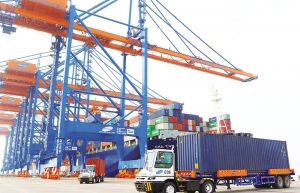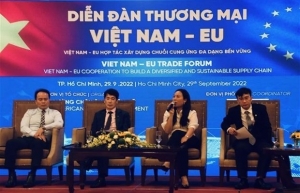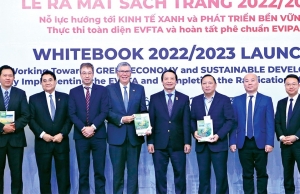Meeting sustainable standards can boost EU access
The EU-Vietnam Free Trade Agreement has established a framework for closer economic integration, expanded market access, and strengthened bilateral cooperation, and four motives demonstrate that businesses will inevitably adopt VSS.
 |
| Dr. Dinh Thi Ngoc Bich - Institute for European Studies |
First is establishing accountability for the environmental and social impact of value chains. This is also how major businesses have sought to implement VSS to safeguard their brands and mitigate reputational risk.
Secondly, the product’s added value is translated into the product’s price and insurance, as well as the market access opportunity that VSS-branded products bear.
Thirdly, a commitment to sustainability, ethical values, and social responsibility pertaining to labour standards, remuneration, working hours, occupational safety, and other factors contribute to the improvement of employees’ quality of life.
Finally, innovation and creativity through the transfer of knowledge lead to increased production and management efficiency in businesses. For instance, LEED-certified companies in the construction industry are required to adopt cutting-edge technology to reduce emissions and improve energy efficiency.
Businesses, social organisations, and the Vietnamese government have utilised the most recent VSS standards for sustainable development. In light of the fact that Vietnam has evolved into an international player in sustainable development and climate change response, this is viewed as both a possibility and an obstacle for the Vietnamese economy.
A variety of voluntary criteria for sustainability are no longer foreign to Vietnamese exporters and foreign-invested businesses in EU-Vietnam trade. Thanks to the implementation of VSS standards, Vietnamese businesses have been perpetually innovating to enhance the quality of their products and the efficacy of their manufacturing processes.
However, Vietnamese enterprises are also subject to progressively stringent EU regulations. To assure the integrity of the global supply chain for all categories of products, standards are no longer optional but compulsory.
For instance, in the woodworking industry, the EU Forest Stewardship Council (FSC) certification exemplifies the stringency required. According to an article published by FSC Asia in January, the outcomes of a transaction verification investigation revealed the basis for the FSC’s decision to block two Vietnamese certificate holders. One enterprise applied full compliance with FSC specifications for wood pellets produced using raw materials from sources that cannot claim to be FSC certified. Another firm dismissed the annual audits of the certification organisation and failed to report transactions with FSC.
When the EU rapidly applies stringent criteria to imported commodities, notably the green standards that have been prioritised for implementation in recent years, trade between Vietnam and the EU may be impacted.
Europe will move to force other nations to apply the same standard or face an environmental tax in order to ensure parity. In October, the 27 EU member states will begin piloting the Carbon Border Adjustment Mechanism (CBAM) in the trade sector, which is responsible for up to 94 per cent of EU industrial emissions. The Farm to Fork (F2F) policy will also have a substantial effect on agricultural product and food exports.
The level of readiness of domestic businesses for VSS standards – particularly new standards such as CBAM and F2F – is still limited. A survey conducted by the Private Economic Development Research Board under the Vietnam Chamber of Commerce and Industry in 2022 revealed that roughly 11 per cent of surveyed firms are aware of the contents of the CBAM mechanism, just over half are unaware of its content, and 36 per cent of businesses were aware but did not understand it.
Moreover, many private enterprises in Vietnam, particularly small- and medium-sized businesses, are still fearful or lack the resources to transition to sustainable production, a process that calls for substantial financial resources and the implementation of numerous advanced technologies.
In many nations with increasingly stringent and substantive standards, trade and investment operations in the direction of green technologies and sustainable products have become prevalent.
Vietnam is advancing towards green exports, specifically the export of low-carbon or environmentally friendly products. This is a promising strategy for nations seeking to decouple economic development from environmental degradation. Vietnamese enterprises and organisations have no alternative but to be more cognisant of VSS in this context.
| The United Nations Forum on Sustainability Standards defines VSS as regulations related to a variety of sustainability indicators, such as gratitude for fundamental human rights, worker health and safety, the environmental impact of manufacturing operations, community relations, land use planning, and other issues with which companies, manufacturers, traders, retailers, or service providers may be required to comply and respond. |
 | Evidence adds up for quality advantages within EVFTA Just two years in entry into force, the EU-Vietnam Free Trade Agreement (EVFTA) has brought large benefits to both the Southeast Asian market and the bloc of nearly 450 million people. |
 | Vietnam, EU seek to boost cooperation in green, sustainable growth Vietnamese enterprises should focus on meeting quality requirements and ensuring green and sustainable growth, experts said at the Vietnam-EU Trade Forum held in Ho Chi Minh City on September 29. |
 | EU-Vietnam trade pact still contains vast future benefits Europe and Vietnam are looking to the EU-Vietnam Free Trade Agreement as a way to deepen bilateral trade and investment cooperation with a focus on a greener economy and more sustainable development. |
What the stars mean:
★ Poor ★ ★ Promising ★★★ Good ★★★★ Very good ★★★★★ Exceptional
 Tag:
Tag:
Related Contents
Latest News
More News
- Citi economists project robust Vietnam economic growth in 2026 (February 14, 2026 | 18:00)
- Sustaining high growth must be balanced in stable manner (February 14, 2026 | 09:00)
- From 5G to 6G: how AI is shaping Vietnam’s path to digital leadership (February 13, 2026 | 10:59)
- Cooperation must align with Vietnam’s long-term ambitions (February 13, 2026 | 09:00)
- Need-to-know aspects ahead of AI law (February 13, 2026 | 08:00)
- Legalities to early operations for Vietnam’s IFC (February 11, 2026 | 12:17)
- Foreign-language trademarks gain traction in Vietnam (February 06, 2026 | 09:26)
- Offshore structuring and the Singapore holding route (February 02, 2026 | 10:39)
- Vietnam enters new development era: Russian scholar (January 25, 2026 | 10:08)
- 14th National Party Congress marks new era, expands Vietnam’s global role: Australian scholar (January 25, 2026 | 09:54)





















 Mobile Version
Mobile Version